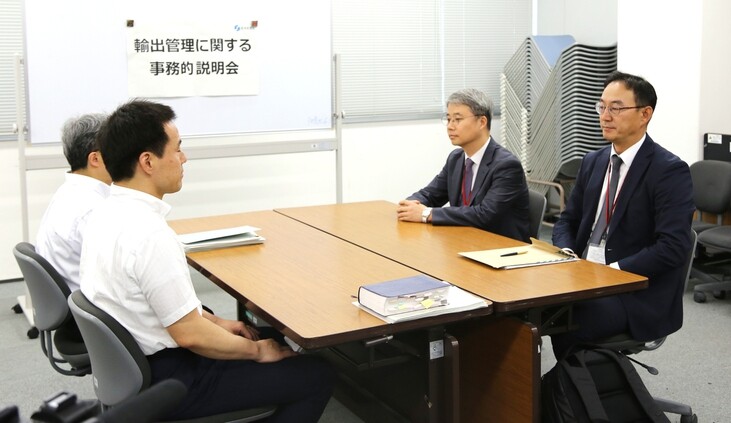hankyoreh
Links to other country sites 다른 나라 사이트 링크
[Editorial] Japan’s shameless export controls and the absurdity of LKP leader’s comments

Despite numerous revelations of the baselessness of its claims regarding its trade retaliation measures, Japan has reportedly reaffirmed its plans to remove South Korea from its “white list” of countries receiving preferential treatment for strategic goods. Rather than continuing to change its story and broadening the scope of its retaliatory measures, Japan should immediately withdraw its plan to take South Korea off its white list.
In a July 12 working-level meeting on South Korea-Japan export controls, Japan reportedly explained that the “inappropriate issues” it cited as a reason for its export regulations were “not a reference to North Korean exports of strategic goods.” With this, it walked back its position voicing concerns that hydrogen fluoride – an ingredient in sarin gas – could be exported to North Korea through the South. Indeed, a report by the UN Security Council Sanctions Committee on North Korea’s expert panel showed that the country responsible for exporting items with potential military uses to North Korea has not been South Korea, but Japan.
In reaffirming its plans to exclude South Korea from the white list during the meeting, Japan reportedly cited its failure to implement “catch-all regulations.” These regulations involve export reviews for all items that could be diverted into weapons production – yet the explanation from South Korea’s Ministry of Trade, Industry, and Energy indicates that South Korea has a similar level of catch-all regulations to Japan’s. It’s an absurd claim that is not even worth refuting. An estimated 1,100 exports to South Korea stand to be affected if South Korea does proceed as announced with its decision to remove South Korea from the white list at a Cabinet meeting later this month. That would result in the South Korea-Japan export conflict spiraling beyond all control. Rather than making the situation worse, we hope the Japanese government will act responsibly and enter diplomatic discussions with Seoul.
Under the circumstances, it’s deeply dismaying to see the Liberty Korea Party – South Korea’s top opposition party – seemingly focused solely on criticizing the South Korean administration. In a Facebook message on July 13, LKP leader Hwang Kyo-ahn wrote, “When the past and present fight, it is the future that is sacrificed. The gist of this issue is that South Korea-Japan relations that have had their feet bound since the past have led to the unfortunate situation today.” He also wrote that it was “truly frustrating to see that the Moon Jae-in administration not only failed to prepare in any way for a predictable disaster, but has not been responding properly now that it has taken place either.” This comes across as suggesting that the fundamental reason for the trade conflict is the South Korean administration’s fixation on historical issues like forced labor mobilization and the comfort women. This is preposterous.
Hwang was prime minister under the Park Geun-hye administration in 2015, when it went behind the South Korean public’s backs to pursue a comfort women agreement with the Japanese government and attempted to intervene in Supreme Court rulings on cases involving forced labor mobilization. It’s another example of dissociative thinking to talk about “leaving the past behind” without a shred of reflection on his own past mistakes. Hwang seems to believe that the South Korea-Japan comfort women agreement that was implemented without the public’s consent was meant for the sake of the “future.” With the top opposition party and conservative media adopting this reasoning, it is any wonder the Abe administration is citing “public opinion in South Korea” as a basis for pushing its reckless trade retaliation agenda?
Please direct comments or questions to [english@hani.co.kr]

Editorial・opinion
![[Column] Has Korea, too, crossed the Rubicon on China? [Column] Has Korea, too, crossed the Rubicon on China?](https://flexible.img.hani.co.kr/flexible/normal/500/300/imgdb/original/2024/0419/9317135153409185.jpg) [Column] Has Korea, too, crossed the Rubicon on China?
[Column] Has Korea, too, crossed the Rubicon on China?![[Correspondent’s column] In Japan’s alliance with US, echoes of its past alliances with UK [Correspondent’s column] In Japan’s alliance with US, echoes of its past alliances with UK](https://flexible.img.hani.co.kr/flexible/normal/500/300/imgdb/original/2024/0419/2317135166563519.jpg) [Correspondent’s column] In Japan’s alliance with US, echoes of its past alliances with UK
[Correspondent’s column] In Japan’s alliance with US, echoes of its past alliances with UK- [Editorial] Does Yoon think the Korean public is wrong?
- [Editorial] As it bolsters its alliance with US, Japan must be accountable for past
- [Guest essay] Amending the Constitution is Yoon’s key to leaving office in public’s good graces
- [Editorial] 10 years on, lessons of Sewol tragedy must never be forgotten
- [Column] A death blow to Korea’s prosecutor politics
- [Correspondent’s column] The US and the end of Japanese pacifism
- [Guest essay] How Korea turned its trainee doctors into monsters
- [Guest essay] As someone who helped forge Seoul-Moscow ties, their status today troubles me
Most viewed articles
- 1[Column] The clock is ticking for Korea’s first lady
- 2Samsung barricades office as unionized workers strike for better conditions
- 3After 2 months of delayed, denied medical care, Koreans worry worst may be yet to come
- 4[Correspondent’s column] In Japan’s alliance with US, echoes of its past alliances with UK
- 5[Column] Has Korea, too, crossed the Rubicon on China?
- 6Hong Se-hwa, voice for tolerance whose memoir of exile touched a chord, dies at 76
- 7[Editorial] When the choice is kids or career, Korea will never overcome birth rate woes
- 8Constitutional Court rules to disband left-wing Unified Progressive Party
- 9Nearly 1 in 5 N. Korean defectors say they regret coming to S. Korea
- 10‘Right direction’: After judgment day from voters, Yoon shrugs off calls for change